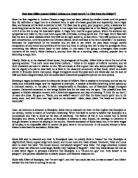How does Miller present ideas about ‘settling for half’ in the play?
One of the strongest messages that Miller presents about ‘settling for half’ is that there is a need to settle for half between Sicilian morals and the US Law system. At the beginning of the play, the chorus figure, Alfieri, states how ‘we settle for half and we like it’, and this ‘settling for half’ is again repeated at the end of the play. It is likely that Alfieri is a figure of authorial intrusion, and so these views about ‘settling for half’ are likely to be Miller’s own. Because Alfieri is a ‘lawyer’, he is naturally a symbol of the US Law system. He is described to be ‘in his fifties, turning gray’. This is possibly used by Miller to suggest that the US Law system is 50 years out of date, and the fact that he is ‘turning gray’ could be symbolic of how the US Law System is becoming increasingly out of date. Furthermore, the illustration of ‘gray’ hair could be a blend between the ‘black and white’ US Law system, and so, through this, it is likely that Miller is trying to convey his own thoughts of the workings of the US Law System. However, Miller also criticises the Sicilian moral code, by portraying Marco’s downfall. Initially, the audience are told that Marco arrives to earn money to provide for his family. However, his belief in Italian Morals, and the belief that ‘all the law is not in a book’ results in him killing Eddie, and therefore, having no choice but to be deported back to Italy. He even states that ‘in my country he would be dead now’, and this is used to highlight the severity and ruthlessness that the Italian Morals can operate with. Through the fact that neither men get what they want through the US Law system, and Alfieri states that ‘there is nothing you can do’ and that ‘the hearing is just a formality, but also that the reliance on Italian morals leads to the downfall of both men, it is possible that Miller is trying to showcase the need to settle for half between the US Law system and the Italian moral code.








